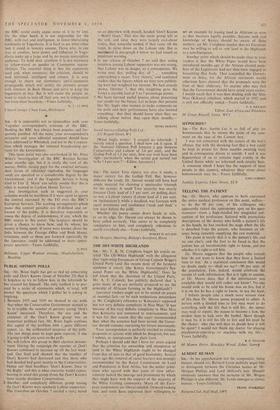PUBLIC OPINION POLLS
Sta,---Mr. Brian Inglis has got so tied up concerning polls and Don't, Knows (issue of October 23) that it is hopeless to try to follow him in the labyrinth he haS created- for himself. The only method is to pro- ceed by a series of statements which, in total, will answer the questions which 1 gather he is asking or implying.
1. Between 1955 and 1959 we showed in our polls that when the Conservative Government seemed to he in trouble the number, of persons saying 'Don't Know' increased. Therefore, the size and the existence of the Don't Know group was an important political fact. Mr. Brian Inglis confuses this aspect of the problem with a _quite different aspect, i.e., the arithmetical accuracy of the polls. The two things must be kept quite separate. if one is going to talk any sense on the polls.
2. We will follow this group to their election denoue- ment. During the campaign the number of Don't Knows continued to increase up till the last week- end. Our final poll showed that the number of Don't Knows had decreased and that those who had decided had gone mainly to the Conservatives. Hence our final headlines 'Don't Knows Tu•n to the Right.' and this is what everyone would expect, bearing in mind this group (from the Don't Knows) were mainly dissident Conservatives.
3. Another, and completely different, group among the Don't Knows were apathetic Labour supporters. The Guardian on October 7 carried a story based
on an interview with myself, headed 'Don't Knows —Won't Goes.' This was .the main group left at the end, and since they were largely ex-Labour voters, they naturally tended, if they came off the fence, to come down on the Labour side. But as mentioned in paragraph 4 below we had issued an important warning.
4. In our release of October 7 we said that voting intention among Labour supporters was not strong, that Labour was in. danger, as a consequence. We wrote next day, polling day, of . . something approaching a major Tory victory,' and cautioned readers that the figures which we were now publish- ing were not weighted for turnout. We had already shown, October 7, that this weighting gave the 'Tories a sizeable lead of 5 to 7 percentage points,
5. We have learned useful lessons about presenting our results for the future. Let us hope that persons like Mr. Inglis who venture to make comments on the polls and their performance have also learned something: that they should know what they are talking about before they open their mouths.—
Yours faithfully, HENRY DURANT
Sochi/ Surreys (Gallup Poll) Ltd.,
211 Regent Street, WI
[Brian Inglis writes: `I created no labyrinth : I merely asked a question. I shall' now ask it again. If the National Opinion Poll forecast a gap between Conservative and Labour of 3.6 per cent., and the Gallup Poll of 1.5 per cent., how can both have been right--particularly when the actual gap turned out to be 5.4 per cent.?'—Editor, Spectator.]






































 Previous page
Previous page